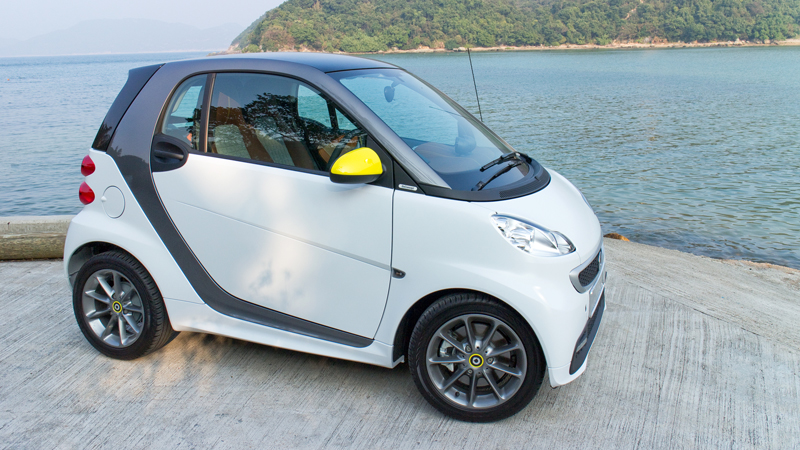Have you ever wondered how fast does a Smart Car go, Well, you’re in luck! This article is about the top speed a Smart Car can reach, so if you’re curious to find out more, keep reading. We’ll discuss how the vehicle’s design and engine capacity affect its maximum speed. We’ll also look at some of the fastest recorded speeds for a Smart Car, so you can better understand what this car is capable of.

Top Speed on a Smart Car
Smart cars might not be the fastest vehicles on the market, but they can still reach impressive speeds. The top speed of a smart car depends on which model you have, as some models offer improved performance over others. A closer look at the different models of smart cars, and their respective maximum speeds, can help drivers decide which is right for them.
The entry-level model in the range is the Smart For two Coupe, whose top speed stands at around 81 miles per hour (mph). This tops out slightly higher than the mid-range Smart For four Hatchback model and its 78 mph limit. Stepping up to the performance-focused Bra bus edition will see your maximum speed jump to 96 mph – quite an improvement from its base counterparts! A three-cylinder petrol engine with electric power steering for easy handling powers all three models.
How fast is a Smart Electric car?
Electric cars are becoming more prevalent, with many manufacturers vying for a market share. However, there is still much to learn about how these vehicles perform. A new report from an industry consortium sheds some light on this topic. According to the report, the average electric car can travel up to 220 mph (354 km/h). This is significantly faster than most gasoline-powered vehicles. Even some of the best electric cars only manage speeds of 150 mph (240 km/h).
The reason for this dramatic difference has to do with how electric motors work. Gasoline engines rely on burning fuel to create heat and power. This heat is used to turn the vehicle forward or backward gears. Electric motors don’t need any fuel, so they can reach higher speeds and operate more efficiently.
How Fast are Smart for Two Electric Cars?
The Smart for Two Electric Drive, or ED, is a small electric vehicle that has been around for almost a decade. It is popular with city dwellers and those who value the environment. One of the most interesting aspects of this car is its impressive performance in terms of speed. How fast are Smart for Two electric cars?
The answer depends on the model of the car you are driving. The standard i-MiEV model can accelerate from 0 to 60 mph in about 14.9 seconds and reach a top speed of 83 MPH. That’s okay for such a small car! Other models, like the Electric Drive Cabriolet, have slightly better acceleration times at 12 seconds from 0 to 60 MPH, while their top speed remains the same at 83 MPH.
With a top speed of 84 mph and a range of 100 miles, this car is perfect for those who want an economical alternative to gasoline-powered vehicles. The Smart for Two Electric Drive also features a 4-speed automatic transmission, which makes it easy to get around town. Weighing in at 1,850 pounds, this car is convenient and lightweight, making it easy to take long trips.
How Fast Does a Smart Car go 0 to 60?
Smart Cargo cars are quickly becoming one of the most popular vehicles due to their convenience, efficiency, and speed. Many car enthusiasts wonder how fast a Smart Cargo vehicle can accelerate from 0 to 60mph. As it turns out, this versatile automobile can reach top speeds in record time.
The Smart Cargo can go from 0 to 60mph in around 10 seconds, making it one of the quickest vehicles available today. This acceleration rate has been tested and confirmed by experienced drivers with top streaks of 0 to 60 in 9.7 seconds. This makes for a fun ride and greatly increases its safety rating since drivers have more control over their speed when driving conditions become unpredictable.
Can you make a Smart car Faster?
Making a smart car faster can be done with the right modifications, but it’s important to understand how each modification will affect the engine. It is possible to increase the power up to 75hp and torque up to 115 lb-ft in a smart car; however, this should only be done by an experienced technician or mechanic. Each modification has its negative upshot, ranging from increased fuel consumption, more emissions, and higher wear on components.
If you want an increase in performance, ensure that your engine is running optimally before making any modifications. If your engine runs correctly, then modifying it may be a good use of time and money as it will yield no gains.

How to Make a Smart Car Faster Than the Average Car?
Making your car faster than the average car can be a daunting task. You must think carefully about what parts you’ll need to get and how much you want to spend. However, if you have a smart car, some specific changes can be made to improve its performance and make it faster than the average car.
The first step is to upgrade your engine components. Investing in a new exhaust system or cold air intake will give your vehicle more power and acceleration, allowing it to perform better than the average car.
Additionally, consider replacing certain parts of your suspension system with lighter materials such as carbon fiber or aluminum that won’t add weight but will help improve handling and cornering capabilities – both important aspects when trying to increase speed. Finally, consider getting larger wheels for improved traction and stability on the road, which will also help enhance overall performance.
Can Smart Cars go on the Highway?
Smart cars have many features that help them safely navigate the roads. They use sensors to detect objects in their surroundings and adjust their speed accordingly. They also have lane-assist features which keep them within their intended lane. However, these features do not necessarily mean that a smart car can drive on highways at safe speeds.
The answer to whether or not a smart car can go on the highway depends on the make and model of the vehicle. Some models can handle fast speeds, while others need help to reach even basic acceleration levels.
Conclusion
The smart car is a practical and economical vehicle that offers drivers a unique and efficient way to get around town. It may not be the fastest car on the road, but its small size and fuel-saving design make it an ideal choice for many drivers. For those looking for some extra speed, there are cars available with higher top speeds. With careful research and consideration of their individual needs, drivers can find how fast does a smart car go.
Read more: How to Remove Scratches from Car Bumper | Full Guide
FAQs
What is the max Speed of a Smart car?
The maximum speed of a smart car is 96 mph. This is the same top speed as other small cars, such as the Honda Fit and Toyota Yaris. The smart car’s lightweight design and aerodynamic shape allow it to reach this speed with impressive efficiency.
How Fast Does a Smart Mini Cargo?
It offers impressive fuel economy, excellent maneuverability, and a top speed of 68 miles per hour. This makes it ideal for city driving, as well as longer trips on the highway.
Can a Smart car be turbocharged?
Yes, a smart car can be turbocharged. The added power and fuel efficiency can significantly affect the car’s performance. Turbo charging also adds weight to the car, so it may not be the best option if you are looking for a lightweight vehicle.
Are Smart Cars Reliable?
Yes, smart cars are reliable. They typically have more advanced technology than traditional cars, which help them maintain reliability. most smart car manufacturers offer a vehicle warranty, which gives you peace of mind if something goes wrong.

